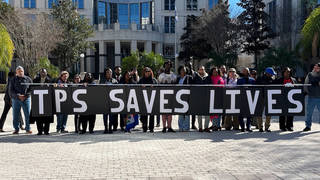
Guests
- Peter Kornbluhsenior analyst for Latin America at the National Security Archive.
The trailblazing human rights attorney Peter Weiss died November 3 at the age of 99. Weiss served on the board of the Center for Constitutional Rights for nearly five decades, where he worked to end South African apartheid and the Vietnam War, fought for nuclear disarmament and sought justice for victims of the U.S.-backed Contras in 1980s Nicaragua. He pioneered using the 1789 Alien Tort Statute in human rights cases. He also represented the family of U.S. journalist and human rights activist Charles Horman in a case against Henry Kissinger and others, after Horman was disappeared and killed in Chile soon after the U.S.-backed 1973 coup.
“He never ceased to push for a more just system, a more equitable system, along with his extraordinary wife Cora Weiss,” says Peter Kornbluh, senior analyst at the National Security Archive. “There’s not enough words to describe how important Peter was to the progressive movement, to human rights, over these last decades.”
Transcript
AMY GOODMAN: Peter, before we go, I want to ask you about another Peter. The trailblazing human rights attorney Peter Weiss has died at the age of 99, just shy of his 100th birthday. He was on the board of the Center for Constitutional Rights for nearly half a century. He worked to end South African apartheid, to end the Vietnam War, fought for nuclear disarmament, sought justice for U.S. victims of the U.S.-backed Contras in Nicaragua in the ’80s, pioneered the 1789 Alien Tort Statute in human rights cases, represented the U.S. journalists, the family of human rights activist Charles Horman in a case against Henry Kissinger and others, after Horman was disappeared and killed in Chile after the U.S.-backed September 11th, 1973, coup.
I wanted to play a clip of Peter years ago on Democracy Now! talking about that case.
PETER WEISS: Our case was dismissed because we couldn’t conduct discovery. When you bring any kind of case, civil or criminal, you have to look for the evidence and produce the evidence to the judge or the jury. And everything that we wanted, we were told, was classified and would not be made available to us. So, eventually, the case had to be dismissed.
AMY GOODMAN: So, that was Peter Weiss. Peter Kornbluh, you knew him well.
PETER KORNBLUH: That was the beautiful and conscientious and activist Peter Weiss. He never ceased to push for a more just system, a more equitable system, along with his extraordinary wife Cora Weiss. They were the supporters of so many of the progressive institutions that we know today, including the Center for Constitutional Rights, which did so much incredible legal work on human rights and on trying to hold the U.S. government accountable for the atrocities that it committed around the world.
There’s not enough words to describe how important Peter was to the progressive movement, to human rights over these last decades, since the late '50s, early 1960s. And it's sad to say goodbye to him, but we all continue to be inspired and guided by every deed, good deed, that he did over his entire life.
AMY GOODMAN: Peter Kornbluh, I want to thank you for being with us, senior analyst at the National Security Archive. We’ll link to your pieces in Foreign Policy and The Nation.
That does it for our show. I’ll be at the St. Louis International Film Festival tonight for two screenings of Steal This Story, Please!, a documentary about Democracy Now! I’ll be 7:30 at B&B Theatres in Creve Coeur West Olive 10 and Bowling, and at 9:00, the second showing of Steal This Story, Please!, at MX Movies and Bar. You can check out information, learn about tickets by going to democracynow.org under speaking events. We’ll be doing the Q&A with one of the directors of the film. Happy early birthday to Diana Parra and Ginny Keenan. I’m Amy Goodman. Thanks for joining us.












Media Options